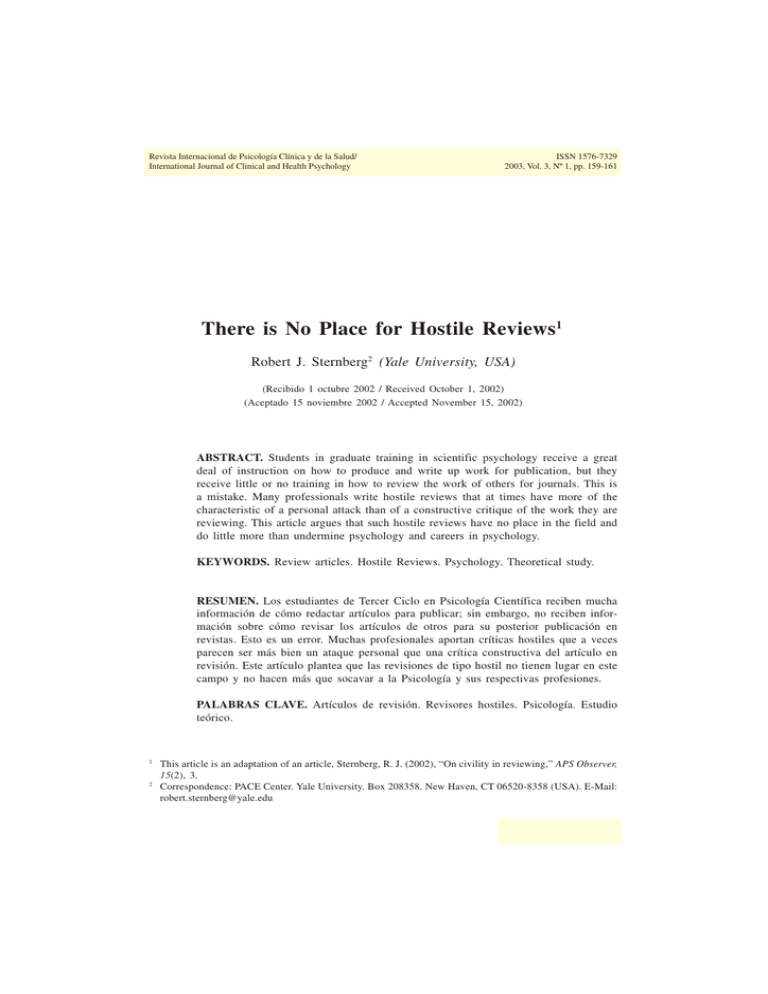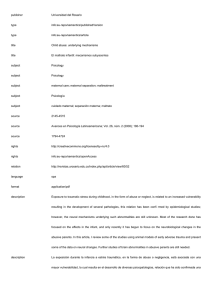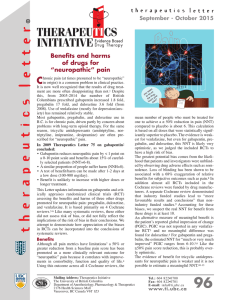There is No Place for Hostile Reviews1
Anuncio

Revista Internacional de Psicología Clínica y de la Salud/ SANDIN. Estrés y factores sociales International Journal of Clinical and Health Psychology ISSN 1576-7329 2003, Vol. 3, Nº 1, pp. 159-161 159 There is No Place for Hostile Reviews1 Robert J. Sternberg2 (Yale University, USA) (Recibido 1 octubre 2002 / Received October 1, 2002) (Aceptado 15 noviembre 2002 / Accepted November 15, 2002) ABSTRACT. Students in graduate training in scientific psychology receive a great deal of instruction on how to produce and write up work for publication, but they receive little or no training in how to review the work of others for journals. This is a mistake. Many professionals write hostile reviews that at times have more of the characteristic of a personal attack than of a constructive critique of the work they are reviewing. This article argues that such hostile reviews have no place in the field and do little more than undermine psychology and careers in psychology. KEYWORDS. Review articles. Hostile Reviews. Psychology. Theoretical study. RESUMEN. Los estudiantes de Tercer Ciclo en Psicología Científica reciben mucha información de cómo redactar artículos para publicar; sin embargo, no reciben información sobre cómo revisar los artículos de otros para su posterior publicación en revistas. Esto es un error. Muchas profesionales aportan críticas hostiles que a veces parecen ser más bien un ataque personal que una crítica constructiva del artículo en revisión. Este artículo plantea que las revisiones de tipo hostil no tienen lugar en este campo y no hacen más que socavar a la Psicología y sus respectivas profesiones. PALABRAS CLAVE. Artículos de revisión. Revisores hostiles. Psicología. Estudio teórico. 1 2 This article is an adaptation of an article, Sternberg, R. J. (2002), “On civility in reviewing,” APS Observer, 15(2), 3. Correspondence: PACE Center. Yale University. Box 208358. New Haven, CT 06520-8358 (USA). E-Mail: [email protected] RIPCS/IJCHP, Vol. 3, Nº 1 160 STERNBERG. There is no place for hostile reviews RESUMO. Os estudantes da formação graduada em Psicologia Científica recebem muita informação relativa a como redigir artigos para publicar; no entanto, não recebem informação sobre como rever os artigos de outros para sua posterior publicação em revistas. Isto é um erro. Muitos profissionais fazem críticas hostis que por vezes parecem ser mais um ataque pessoal do que uma crítica construtiva do artigo em revisão. Este artigo defende que as revisões do tipo hostil não têm lugar neste campo e não fazem mais do que enfraquecer a Psicologia e as suas respectivas profissões. PALAVRAS CHAVE. Artigos em revisão. Revisores hostis. Psicologia. Estudo teórico. I recently received a review of an article I co-wrote and submitted to a journal that was extremely hostile. The reviewer referred to the submitted article as sounding like it was written by a “charlatan attorney.” He referred to parts of my article as “absurd” and as sounding like “gibberish.” It compared my arguments to those of first-year university students.And he suggested that I was “seriously out of [my] element with this topic.” He further recommended that I “refrain from venturing into areas that exceed [my] professional competence.” Other comments in the review were of the same ilk. Fortunately, this hostile review was “confidential.” But what does confidential mean? The supposedly confidential review was seen by the editor, other reviewers, and who knows who else. I might add that there was a second review of the article as well. This review was very favorable. I have heard that, when it comes to reviewing, psychologists are the most hostile of all academics. Whether this is true or I not, I don’t know for sure. What I do know is that more than once in my career, I have been taken aback by the hostility with which reviews of my own work, and the work of others, has been attacked. These reviews usually are written under the cloak of anonymity. Such reviews never should be sent to authors in the first place. They are, I believe, unacceptable, regardless of how bad (or good!) may be the manuscripts being reviewed. Professors spend some amount of time training students in graduate school how to write articles. Unfortunately, they spend little or no time training these students how properly to review articles. Maybe they think reviewing is a natural skill. It isn’t. Explicit training really is needed. Hostile reviews are harmful to everyone. Why? —Fundamental ethics. As a matter of fundamental ethics, hostile reviews violate what sometimes is called the “Golden Rule”—do unto others as you would have them do unto you. No one wants to be treated to disrespect and insults. —Balance. Very few works have absolutely no redeeming value. A reviewer should provide a balanced evaluation of an article. He or she should point out the positive as well as the negative aspects of it. Hostile reviews lack balance. Moreover, any criticism, no matter how severe, can be communicated in a tactful way. RIPCS/IJCHP, Vol. 3, Nº 1 STERNBERG. There is no place for hostile reviews 161 —Stretching the truth. It is rare that more than one of a set of reviews is unremittingly hostile. Often, other reviews even are positive. Few articles are truly terrible. Usually, hostile reviewers are simply grinding an axe. —Maintaining credibility in order to effect change. In general, people do not change their behavior in response to demeaning or insulting behavior. Rather, when they are treated with hostility, they are likely to assume that the hostile person lacks credible-that he or she is out to attack them personally rather than truly to review their work. —Undermining self-efficacy. More senior investigators usually, although not always, take occasional hostile reviews in stride. They know that such reviews are like a “tax” to pay for being an academic. Besides, they often have permanent positions, so do not have to worry that they will lose their jobs. But young investigators may become quite discouraged and even give up hope of ever succeeding in the field. They are likely to think they are the problem, not the reviewer. —Creating animosities. We often have the most to gain from those with whom we disagree. But hostile reviews create only animosity, not behavioral change. When you find out that a particular individual has brutally attacked your work, you are more likely to engage in a fight with or a flight from that individual than to engage in meaningful dialogue. —Self-presentation. When a scholar writes a hostile review, that scholar makes him or herself look bad. Reviews are not good places to take out one’s displaced anger or one’s bad days. What I have said is self-evident. Why even bother to say it? The reason is that, despite the obvious inconsideration and lack of decency that hostile reviews display, such reviews continue to be written and disseminated. I saw them 27 years ago when I started as an assistant professor, and I see them today. Hostile reviews help no one, least of all, the reviewers. Some problems in the world have no obvious solution. The problem of hostile reviews, however, does allow a simple solution. Don’t write them. If you are an editor, do not disseminate and certainly do not publish them. If you are the author receiving such a review, ignore the ad hominem content and hostile tone of the comments. Focus only on the best use possible of the substantive points made in the review. Really, everyone involved in the reviewing process deserves better treatment. Hostile reviews are unacceptable, and none of us should write them. RIPCS/IJCHP, Vol. 3, Nº 1


